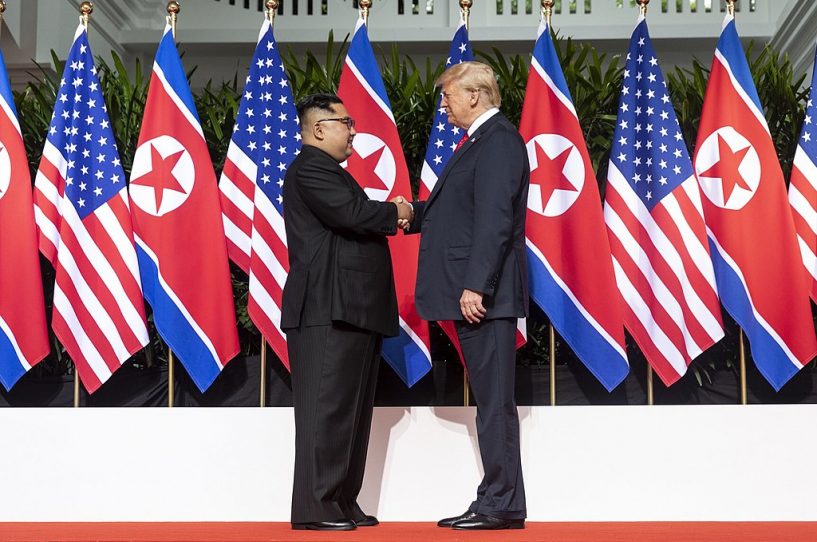June 14, 2018 Reading Time: 3 minutes
 Reading Time: 3 min read
Reading Time: 3 min readImage Credit: Dan Scavino Jr. /Wikimedia Commons
Farah Ibrahim and Malinda Meegoda*
Following their historic summit in Singapore on 12 June 2018, US President Donald Trump and North Korea’s Chairman Kim Jong-un signed a joint statement,1 stating that North Korea will work “towards the complete denuclearisation of the Korean Peninsula,” and both parties will “commit to recovering POW/MIA remains’ from the Korean War.”
The following are highlights from President Trump’s press conference2 held after the meeting, during which he detailed his thoughts and expectations on six key issues.
(1) “The past does not have to define the future. Yesterday’s conflict does not have to be tomorrow’s war. And as history has proven over and over again, adversaries can indeed become friends.”
(2) “There’s never been anything like what’s taken place now. … Billions of dollars were given, and you know, the following day the nuclear program continued. But this is a much different time, and this is a much different President … ”
(3) “But to realise their amazing destiny, to reunite their national family, the menace of nuclear weapons will now be removed.”
(4) “I want to get our soldiers out. I want to bring our soldiers back home. We have, right now, 32,000 soldiers in South Korea, and I’d like to be able to bring them back home …”
(5) “[W]e’re going to have a lot of people there, and we’re going to be working with them on a lot of other things. But this is complete denuclearisation of North Korea, and it will be verified.”
(6) “[I]t does take a long time to pull off complete denuclearisation [but] once you start the process, it means it’s pretty much over; you can’t use them.”
(7) “We will be stopping the war games [military exercises with South Korea], which will save us a tremendous amount of money … ”
(8) “I also will be inviting Chairman Kim, at the appropriate time, to the White House … I said, at the appropriate time. We want to go a little bit further down the road.”
(9) “I believe it’s a rough situation over there. … And we did discuss it today pretty strongly. I mean, knowing what the main purpose of what we were doing is: denuking … We’ll be doing something on it. It’s rough. It’s rough in a lot of places.”
(10) “But [there’s] not much I can do right now. At a certain point, I really believe he’s going to do things about it. I think they are one of the great winners today, that large group of people that you’re talking about.”
(11) “We want to get [the agreement] done; he wants to get it done. We’re also working very much with South Korea. We’re working with Japan. We’re working with China, to a lesser extent, but we’re working with China.”
(12) “… I think that South Korea and I think that Japan will help them very greatly [on the costs]. They know they’re going to have to help them. … We won’t have to help them. The United States has been paying a big price in a lot of different places.”
1The White House. (2018). Joint Statement of President J. Donald of the United States of America and Chairman Kim Jong Un of the Democratic People’s Republic of Korea at the Singapore Summit. [online] Available at: https://www.whitehouse.gov/briefings-statements/joint-statement-president-donald-j-trump-united-states-america-chairman-kim-jong-un-democratic-peoples-republic-korea-singapore-summit/
2The White House. (2018). Press Conference by President Trump. [online] Available at: https://www.whitehouse.gov/briefings-statements/press-conference-president-trump/
*Farah Ibrahim is a Communications Assistant at the Lakshman Kadirgamar Institute of International Relations and Strategic Studies (LKI). Malinda Meegoda is a Research Associate at LKI. The opinions expressed in this article are the authors’ own and not the institutional views of LKI, and do not necessarily reflect the position of any other institution or individual with which the authors are affiliated.